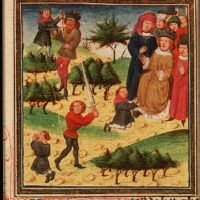“David asked him, ‘How is it that you weren’t afraid to raise your hand to destroy Adonai’s anointed?'”-2 Samuel 1:14
Let’s get back to David’s exchange with the young Amalekite messenger.
After the boy told David how he had performed a mercy killing on Saul, David asked the boy the only question that mattered to him.
“How is it that you weren’t afraid to raise your hand to destroy Adonai’s anointed?”
To be clear, when David said “afraid”, David wasn’t asking the young man if he was scared of Saul…
Or if the boy was worried about getting in trouble with the other Israelites if they saw what he did and took offense that he had killed the king.
No, David was asking why the boy didn’t respect the sanctity and holy office of Israel’s throne.
Where did this Amalekite foreigner get the gall to think he could raise his hand against a man whom God had chosen and anointed as king?
David was questioning the boy’s disrespectful audacity to act against someone chosen by God.
David had always believed that, no matter how Saul behaved, God had chosen and anointed him as king, so Saul should not be harmed.
That’s why David executed the Amalekite man without any hesitation, which means he believed the man’s story.
In David’s mind, an Amalekite would always be an Amalekite.
David told him, “Your blood is on your own head.”
Now this phrase doesn’t mean what we think it means.
To our modern minds, we think it means “the homie got what he deserved”, right?
But Biblically speaking, there’s some serious theological implications embedded in that phrase.
It means that according to the Levitical sacrificial system, there was no atonement available for what the boy did.
In such a case, only the guilty person’s blood can make things right with God – one of those crimes was killing someone without a good reason.
David was saying that killing Saul was a serious crime, one for which there could be no forgiveness or mercy.
Alrighty, let’s switch over to the takeaway.
Right before executing the boy, David asked him…
“How is it that you weren’t afraid to raise your hand to destroy Adonai’s anointed?”
So here’s the thing.
This is a similar question God is going to ask every human being on judgment day.
However, it will take the form more along the lines of…
“What did you do with my son?”
The question will be about His anointed son Yeshua.
Every human being is going to have to deal with that question one way or another.
I beg you to think seriously about that question now while you still have the breath of life flowing through your lungs.
Because your eternal fate lies in the balance depending on your answer to that question.
Later.
CONNECTING THIS TEACHING TO THE NEW TESTAMENT
“For he has set a day when
he will judge the world
with justice by the man
he has appointed.
He has given proof of this
to everyone by raising
him from the dead.”
-Acts 17:31
“Whoever believes in him is not condemned,
but whoever does not believe stands condemned
already because they have not believed in
the name of God’s one and only Son.”
-John 3:18
“Yeshua answered,
‘I am the way and the truth and the life.
No one comes to the Father except through me.'”
— John 14:6
“Whoever has the Son has life;
whoever does not have the
Son of God does not have life.”
— 1 John 5:12
“Salvation is found in no one else,
for there is no other name under
heaven given to mankind
by which we must be saved.”
— Acts 4:12
“Whoever acknowledges me before others,
I will also acknowledge before
my Father in heaven.
But whoever disowns me before others,
I will disown before my Father in heaven.”
— Matthew 10:32-33
“Whoever believes in the Son has eternal life,
but whoever rejects the Son will not see life,
for God’s wrath remains on them.”
— John 3:36
“He will punish those who do not know God
and do not obey the gospel of our Lord Yeshua.
They will be punished with everlasting destruction
and shut out from the presence of the Lord
and from the glory of his might.”
— 2 Thessalonians 1:8-9
“There was a landowner who planted a vineyard.
He put a wall around it, dug a winepress in it
and built a watchtower. Then he rented the
vineyard to some farmers and moved to another place.
When the harvest time approached, he sent his
servants to the tenants to collect his fruit.
The tenants seized his servants; they beat one,
killed another, and stoned a third.
Then he sent other servants to them,
more than the first time,
and the tenants treated them the same way.
Last of all, he sent his son to them.
‘They will respect my son,’ he said.
But when the tenants saw the son,
they said to each other, ‘This is the heir.
Come, let’s kill him and take his inheritance.’
So they took him and threw him out of the
vineyard and killed him.
Therefore, when the owner of the
vineyard comes, what will he do to those tenants?”
‘He will bring those wretches to a wretched end,
” they replied, “and he will rent the vineyard
to other tenants, who will give him his share
of the crop at harvest time.’
-Matthew 21:33-41




Leave a Reply